Datasheet
Year, pagecount:2010, 3 page(s)
Language:English
Downloads:63
Uploaded:September 16, 2012
Size:13 KB
Institution:
-
Comments:
Attachment:-
Download in PDF:Please log in!
Comments
No comments yet. You can be the first!Content extract
MLA Interview Questions Call the school before the interview -- Try to find out as much information as possible. How many people will interview me? How long will the interview last? Can I get the names of the interviewers? [Important for your research] Research the school in-depth -- request their catalogue, check the net Check out your prospective interviewers and colleagues Practice the art of representing yourself In setting your interview time, make sure it works for you -- you are not free all day. Make sure you have time to compose yourself, etc. [Write down your interview information: Hotel name, interviewers, day, date, time, and length of interview] Goal--to be so thoroughly practiced and rehearsed that your self-presentation seems relaxed, spontaneous and effortless DO Review job specifications Inform yourself thoroughly about department and
institution Analyze your own strengths and weaknesses Request of your department some practice interviewing Familiarize yourself with widely used texts Prepare questions to ask (teaching load, class size, number of majors, range of courses you will teach, library resources, etc.) Dress neatly If possible allow yourself an hour between interviews Be prepared to discuss approaches to languages and literature teaching Think about courses you would like to teach Be aware of nervousness Come on time Shake hands Be polite Watch body language (your own and interviewers) Project interest, enthusiasm, and ambition Speak up clearly Listen attentively Keep eye contact with interviewer Be prepared for aggressive questions Answer openly, directly and honestly Be specific both in answers and in your own questions Inform institution if you receive and/or accept an offer elsewhere Try to demonstrate your language ability Bring out your strong points Talk about special features in your background,
skills, experience, interests, and goals Summarize your qualifications for the job Find out when decision will be made Write follow-up thank you letter DON’T Slouch Mumble Be impolite or long-winded Use terms such as “you know,” “like,” etc. Be apologetic or arrogant Chew gum during interview Smoke without asking permission Appear opinionated or contentious Argue with interviewer Let yourself be intimidated Volunteer negative information Downgrade other candidates, jobs, or institutions Get off the track or ramble Ask questions for which answers may be found in catalog Overstay your welcome Types of questions to expect from interviewers: 1. Major research University, large department (these are questions that job seekers have been asked) Take two or three minutes to tell us what we will learn from your dissertation that we didn’t know before? [Research university -- most important question,
potential as a publishing scholar] Is it heading toward a book? We’re developing a program in Irish studies (women, cross-cultural, etc.) Would you be interested in teaching a course in twentieth century Irish studies (women playwrights, Harlem -Dublin)? Mr. Smith, I’m interested in why you’re interested in us? [Personal question] What do you feel about the conflict between teaching and research? We’re interested in improving our composition course. I see you taught composition at Boston College. Can you tell us what your view on composition teaching is? Would you comment on the controversy that composition courses are being used for political correctness? What are your thoughts? [Controversy] Would you be comfortable supervising TAs in composition? Is that something you want to do? We have very collegial members of the department, we think, but how would you handle a situation if you thought your colleagues were not collegial? [Will you become
rattled under pressure] I’m interested in getting your reaction to our place. It’s quite different from Boston College and, of course, Boston. We’re not exactly rural but we are certainly more isolated Anyone we hire we’d like to be comfortable at the university and in our community. We’d like you to be around for a while [What type of colleague would you be] Could you help us build a film series? Do you have any question for us? 2. Small liberal arts department/college What teaching strengths would you bring to our college? I’m sure you’re familiar with the depth-versus-breadth controversy. Given the kinds of issues raised in that controversy, how would you organize a course in American literature? Can you give us an example of how you would introduce multicultural materials and the idea of ‘conversation’ in a course on American literature? Do you lean toward a particular theoretical approach? Your vita says you’ve taught
writing-intensive survey classes. Can you tell us something about what you do in these? Does your writing course use literary materials? Does it use materials from other disciplines? I was very interested in your dissertation abstract. Do you have any plans to publish your dissertation? Do you see some journal articles coming out of this in lieu of a book? NOTE: Don’t begin to answer questions until you fully understand them Types of questions to consider asking interviewers: Is there support for research? How would you describe your undergraduates? Have you an interest in developing an Irish studies minor? Are your English majors interested in taking upper-level Irish courses? Mindset: Self-confidence can be a serious problem for job-candidates. Remember that an important change of gears -of roles -- occurs with the job interview In graduate school, professional subordination and deference were built into your role. An important and difficult task at
the job-hunting stage of your career is to stop interacting with faculty members as a student, and instead to be convincing to the hiring department that you are a colleague and an equal. A job interview is not an oral exam. The interviewers’ basic assumption should always be that you know the things you claim to know. Therefore, don’t feel anxious about all the things you don’t know yet Neither party is necessarily in control. As a new jobseeker you should plan on taking more initiative than you were probably expecting to take. Don’t wait for the interviewer to ask you whether you have questions, but treat the entire interview as -- among other things -- an opportunity for you to find out what you need to know about the job, the department, and the school, and to say things you think should be said about your interests, qualifications, and needs. At MLA you sit in a room with a bunch of people who are interested in hearing you talk about your work. When’s the next time
that’s going to happen? A website with additional information on the job interview process: www.englishupennedu/~mgamer/interviewhtml
institution Analyze your own strengths and weaknesses Request of your department some practice interviewing Familiarize yourself with widely used texts Prepare questions to ask (teaching load, class size, number of majors, range of courses you will teach, library resources, etc.) Dress neatly If possible allow yourself an hour between interviews Be prepared to discuss approaches to languages and literature teaching Think about courses you would like to teach Be aware of nervousness Come on time Shake hands Be polite Watch body language (your own and interviewers) Project interest, enthusiasm, and ambition Speak up clearly Listen attentively Keep eye contact with interviewer Be prepared for aggressive questions Answer openly, directly and honestly Be specific both in answers and in your own questions Inform institution if you receive and/or accept an offer elsewhere Try to demonstrate your language ability Bring out your strong points Talk about special features in your background,
skills, experience, interests, and goals Summarize your qualifications for the job Find out when decision will be made Write follow-up thank you letter DON’T Slouch Mumble Be impolite or long-winded Use terms such as “you know,” “like,” etc. Be apologetic or arrogant Chew gum during interview Smoke without asking permission Appear opinionated or contentious Argue with interviewer Let yourself be intimidated Volunteer negative information Downgrade other candidates, jobs, or institutions Get off the track or ramble Ask questions for which answers may be found in catalog Overstay your welcome Types of questions to expect from interviewers: 1. Major research University, large department (these are questions that job seekers have been asked) Take two or three minutes to tell us what we will learn from your dissertation that we didn’t know before? [Research university -- most important question,
potential as a publishing scholar] Is it heading toward a book? We’re developing a program in Irish studies (women, cross-cultural, etc.) Would you be interested in teaching a course in twentieth century Irish studies (women playwrights, Harlem -Dublin)? Mr. Smith, I’m interested in why you’re interested in us? [Personal question] What do you feel about the conflict between teaching and research? We’re interested in improving our composition course. I see you taught composition at Boston College. Can you tell us what your view on composition teaching is? Would you comment on the controversy that composition courses are being used for political correctness? What are your thoughts? [Controversy] Would you be comfortable supervising TAs in composition? Is that something you want to do? We have very collegial members of the department, we think, but how would you handle a situation if you thought your colleagues were not collegial? [Will you become
rattled under pressure] I’m interested in getting your reaction to our place. It’s quite different from Boston College and, of course, Boston. We’re not exactly rural but we are certainly more isolated Anyone we hire we’d like to be comfortable at the university and in our community. We’d like you to be around for a while [What type of colleague would you be] Could you help us build a film series? Do you have any question for us? 2. Small liberal arts department/college What teaching strengths would you bring to our college? I’m sure you’re familiar with the depth-versus-breadth controversy. Given the kinds of issues raised in that controversy, how would you organize a course in American literature? Can you give us an example of how you would introduce multicultural materials and the idea of ‘conversation’ in a course on American literature? Do you lean toward a particular theoretical approach? Your vita says you’ve taught
writing-intensive survey classes. Can you tell us something about what you do in these? Does your writing course use literary materials? Does it use materials from other disciplines? I was very interested in your dissertation abstract. Do you have any plans to publish your dissertation? Do you see some journal articles coming out of this in lieu of a book? NOTE: Don’t begin to answer questions until you fully understand them Types of questions to consider asking interviewers: Is there support for research? How would you describe your undergraduates? Have you an interest in developing an Irish studies minor? Are your English majors interested in taking upper-level Irish courses? Mindset: Self-confidence can be a serious problem for job-candidates. Remember that an important change of gears -of roles -- occurs with the job interview In graduate school, professional subordination and deference were built into your role. An important and difficult task at
the job-hunting stage of your career is to stop interacting with faculty members as a student, and instead to be convincing to the hiring department that you are a colleague and an equal. A job interview is not an oral exam. The interviewers’ basic assumption should always be that you know the things you claim to know. Therefore, don’t feel anxious about all the things you don’t know yet Neither party is necessarily in control. As a new jobseeker you should plan on taking more initiative than you were probably expecting to take. Don’t wait for the interviewer to ask you whether you have questions, but treat the entire interview as -- among other things -- an opportunity for you to find out what you need to know about the job, the department, and the school, and to say things you think should be said about your interests, qualifications, and needs. At MLA you sit in a room with a bunch of people who are interested in hearing you talk about your work. When’s the next time
that’s going to happen? A website with additional information on the job interview process: www.englishupennedu/~mgamer/interviewhtml
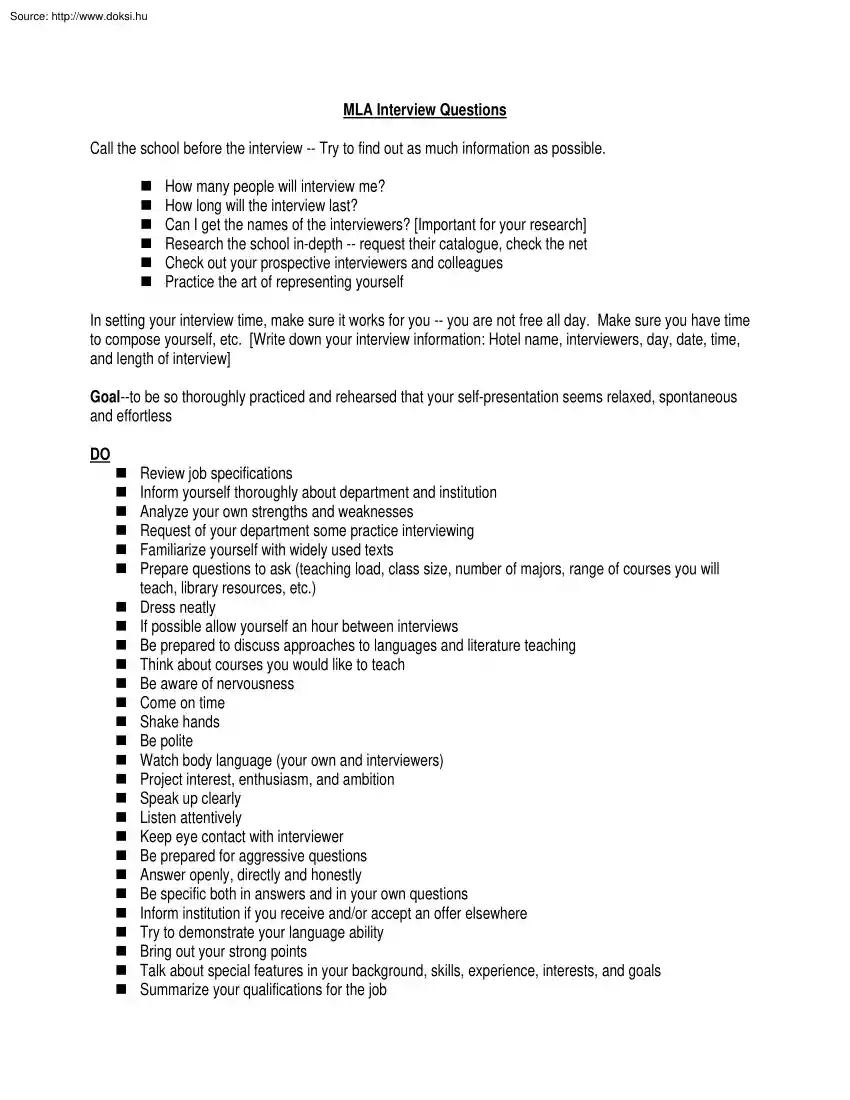
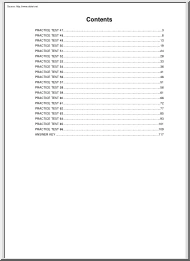
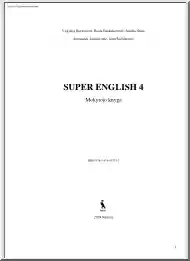
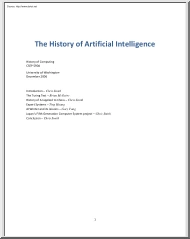
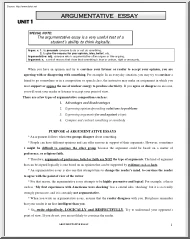
 Just like you draw up a plan when you’re going to war, building a house, or even going on vacation, you need to draw up a plan for your business. This tutorial will help you to clearly see where you are and make it possible to understand where you’re going.
Just like you draw up a plan when you’re going to war, building a house, or even going on vacation, you need to draw up a plan for your business. This tutorial will help you to clearly see where you are and make it possible to understand where you’re going.